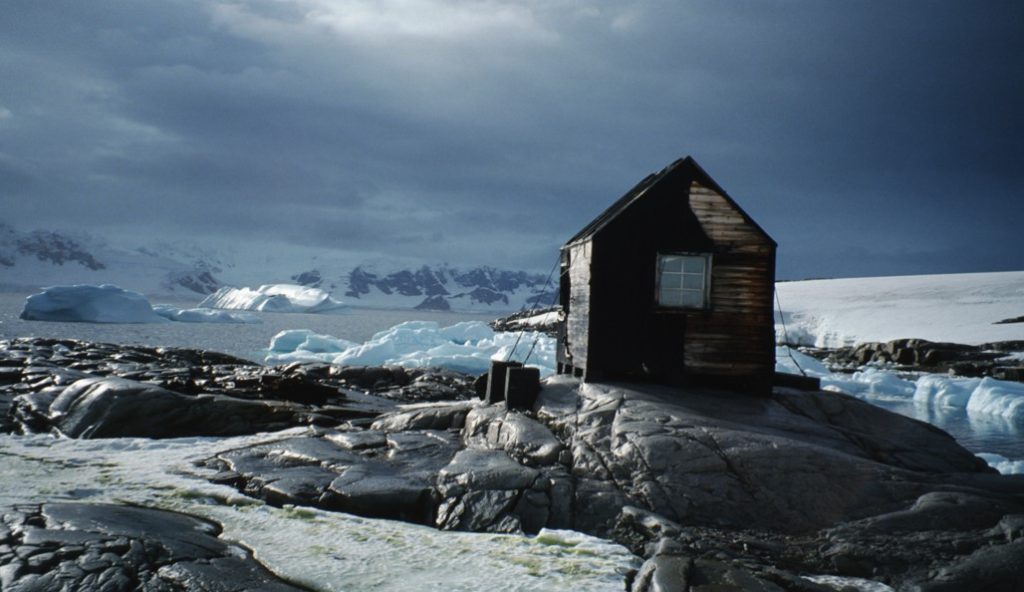Deception Island – a portal to the frozen wastes of a 1950s Antarctic science base
Back in the 1950s-60s, when winter came to Deception Island in the Antarctic, the small group of scientists based there faced long months of total, freezing darkness.
Visitors to this year’s Wigtown Book Festival can step inside a replica refuge hut and glimpse what life was like for members of the British Antarctic Survey based in one of the most remote places on the planet.
It’s a fully immersive experience that uses storytelling, soundscapes, poetry and archive video to transport the audience back in time, and across thousands of miles, to a tiny ring of rock, which is part of an active volcano, set in the vast Southern Ocean off the coast of Antarctica.
The Deception Island multi-sensory artwork is a collaborative work based on a poem by Elizabeth Lewis Williams, whose father George Lewis, was based there from 1959-64.
It is not only a remarkable experience, but offers valuable insights into a place that has witnessed humanity at its best and worst.
Initially used as a base for the ships that drove whales to the edge of extinction, the island with its safe harbour was also used by seal hunters, with similarly catastrophic results.
And yet it has also been a place where scientists have endured some of the toughest conditions on Earth, with only the most basic of comforts, to carry out vital research which has benefited all of humanity.
George was one of the people whose work led to the discovery that manmade chemicals were destroying the ozone layer that protects the world from the sun’s harmful ultraviolet radiation.
Elizabeth said: “Deception Island is a way of ‘transporting’ people somewhere utterly remote, frozen and fascinating and giving them a sense of what it was like, and the importance of shelter for human beings in such an extreme environment.
“When you step inside the hut, it is a step back in time. It is set out as it would have been in the 1950s, with wooden bunk beds, a tiny camp kitchen, Tilley lamps and photos from Deception Island. The world outside disappears.
“It is a portal to a time and place that, when the last ship left for winter, you were cut off for months – no fresh food, no letters, no phone calls, just occasional brief radio messages.
“As few as five men would be sharing a very confined area, for long periods of time – they really had to learn to get along.
“And the yearning for the light was enormous. At the end of winter one of the men went out and climbed a mountain just to see the first rays of the returning sun come above the horizon.”
The project developed from a poem Elizabeth wrote, also called Deception Island, responding to an unpublished book she found after her father’s death about his experiences in the Antarctic.
Brought up in Shetland for most of her life until the age of 18, Elizabeth and her family moved to Peebles in 1979 and then went to England. During her childhood on Shetland she remembers that the Antarctic remained a big influence on her father.
She said: “He felt quite profoundly about it. It certainly shaped the way he brought us up. In our early years we were taught to carry our own provisions and rucksacks – to be self-reliant. He also renovated a croft, very much in the manner of the Antarctic field stations.
“Deception Island was a place where you saw the best and worst of humanity. There was all the evidence of the industrial whaling which nearly stripped the world of its whales. But then you had the scientists there.
“Here was a place my father saw as being a challenging environment, and a difficult workplace, but with utopian potential – run under the Antarctic Treaty system that saw people put aside international disagreements and work together for the greater good.”
This year’s festival (from 23 September to 2 October) is supported by EventScotland as part of Scotland’s Year of Stories 2022.
- Deception Island is presented by Story Machine in collaboration with Elizabeth Lewis Williams. The project team was Sam Ruddock of StoryMachine, the composer Jenni Pinnock, the conservator Geoff Cooper and the filmmaker Mark Hannant.
- It is delivered in partnership with the British Antarctic Survey, UK Antarctic Heritage Trust, and Norwich Science Festival. It is funded by Arts Council England.
- Tickets and full programme wigtownbookfestival.com.






